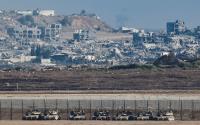24 June 2004Znet
First it was Reagan, now it is Clinton. The homage continues. When Reagan died, Gavin Esler, one of the BBC's star reporters, described the American president responsible for a secret, lawless campaign of terror in central America and for the deaths of untold thousands elsewhere as "a man who was loved even by his political opponents". In the Daily Mail, Esler wrote that Reagan "embodied the best of the American spirit". In the Guardian on 21 June, Bill Clinton was given page after page to promote his self-serving book and relish his mea culpa. He "revealed" that Nelson Mandela had helped him through the Monica Lewinsky affair. How touching. In an "exclusive interview" he was asked nothing about his execution of a subnormal man in order to appease the capital punishment lobby. There was nothing about his violent presidency: the attack on Sudan at the time of Monicagate; the longest aerial bombing of a country (Iraq) since the Second World War and the sanctions that saw off half a million Iraqi infants.
In the United States, media censorship by omission is fast becoming a public issue, commanding meetings that draw several thousand people, such as one recently addressed by Studs Terkel in Wisconsin. The Federal Communications Commission, which under George W Bush has handed most of profitable US broadcasting to Rupert Murdoch and his fellow media godfathers, has received some two million letters and e-mails from Americans protesting at the relegation of journalism to a form of corporate public relations. Although veiled, the trend is similar in Britain. What is the answer for those fed up with official truths? There is the internet, certainly, and there are those venerable things called books. None of the following titles is likely to appear on the summer reading lists, yet each offers an antidote to the daily hagiographies of power.
The first is Bad News From Israel by Greg Philo and Mike Berry of the Glasgow University Media Group. (Pluto). In this admirable study, the authors, who are pioneers in their field, demonstrate the distortion of the UK television coverage of occupied Palestine. Using a series of focus groups drawn from across British society, they reveal how viewers have fallen victim to a dominant bias in favour of Israel. They conclude that Israeli officials are given twice as much airtime as Palestinians get; that news and current affairs on BBC1 are in thrall to (or intimidated by) "Israeli perspectives"; and that the views of Israel-supporting American politicians appear twice as often on the BBC as politicians from any other country, including Britain. TV news says almost nothing about the origins of the conflict, so most viewers have no idea that the Israelis forced Palestinians from their homes in 1948 - or, indeed, who is occupying the Occupied Territories. Viewers are left with the impression that the illegal Jewish settlements are merely vulnerable communities, rather than fortresses that control more than 40 per cent of the West Bank. "I had no idea it was that percentage," said one viewer. "I saw them as small, embattled and surrounded by hostile Palestinians - that's entirely thanks to watching the television news. "Where Israeli forces are described as "soldiers", "troops" or simply "the Israelis", the Palestinians are reported as "terrorists", "killers", "assassins", "self-styled Palestinian martyrs" and "fanatics" regardless of the fact that they are the victims of an illegal occupation. Threaded through the "coverage" is the phoney notion of "balance" between occupier and occupied; Tim Llewellyn, a former Middle East correspondent for the BBC, calls this "the tyranny of spurious equivalence". Every journalist should read this book; every student of journalism ought to be assigned it.A companion to Bad News From Israel is a superb book called Peace Under Fire (Verso). With a foreword by Edward Said, who died last year, this is the story of the "internationals": the outstanding, mostly young people who go to the Occupied Territories and Gaza to bear witness and defend Palestinian families from the might of the Israeli military, especially the bulldozers that demolish their homes. The story of the heroism of Rachel Corrie and Tom Hurndall and their murder by the Israelis, in acts of terrorism as explicit as any suicide bombing, is painful to read, but necessary.
I have mentioned The Sorrows of Empire by Chalmers Johnson (Verso) in these pages; for me, it is the finest primer of the rapacious policies that intimidate the world from Washington, DC. Johnson is one of those American establishment figures who "turned": in his case, from being a pro-Vietnam-war Berkeley historian advising the CIA to a truth-teller. His last book, Blowback, predicted the vengeful events of 11 September 2001 a year before they happened and described how the Pentagon (under Clinton, not Bush) had taken over US foreign policy - in effect carrying out a military coup. In The Sorrows of Empire, he continues to chart the danger of a rampant America with 725 military bases outside the US and the deployment of the CIA as "the president's private army". He predicts that the fate of the Soviet Union - "internal economic contradictions driven by ideological rigidity, imperial overstretch and an inability to reform" - awaits imperial America. Read next Howard Zinn's wonderful A People's History of the United States (HarperCollins). From Columbus to almost the present day, Zinn is always concerned not with historical propriety, but the struggles of ordinary people to overcome the impositions of great power. In A People's History, he unveils a people's America almost hidden behind the flags and flatulence of its plutocrats and of Hollywood.
Michael Albert is the founder of the ZNet website (www.zmag.org), one of the world's great online newspapers. His new book, Parecon (Verso), is a finely argued, thoroughly original manual on "participatory economics" which offers, as he puts it, "a life after capitalism". It is also brave, because it dares to describe not merely what is wrong, but the vision perhaps to fix it. Then there is Good Muslim, Bad Muslim by Mahmood Mamdani (Pantheon), a distinguished voice whose superb analysis of the rise of political Islam leads us back to the enduring battleground not of terrorism, but nationalism. What Howard Zinn has achieved for American historiography, Ken Loach has done for British cinema. Which Side Are You On?, Anthony Hayward's film biography (Bloomsbury), is an eloquent insight into the work of Britain's finest and most courageous film director. Seumas Milne's The Enemy Within
(Verso) was first published in 1994 on the tenth anniversary of the great miners' strike. It is the most important expose of contemporary political Britain I have read; it is about the power of the state to character-assassinate and the vassal role of much of the media. Like Bad News From Israel, it demands to be read by all journalists who care about their craft and by those who aspire to be journalists.
However, if you read only one book this summer, I recommend my all-time favourite, Catch-22 by Joseph Heller (Vintage). Just as Graham Greene's The Quiet American foretold the war in Vietnam and its consequences, so Heller's satirical masterpiece tells us something about the madness of America in Iraq. Whenever I see on the news that brigadier general, the "coalition" spokesman with the eyes of a psychopath, I think warmly of Heller's incorrigibly insane character Major Major, for whom official truth has no bearing in reality.






